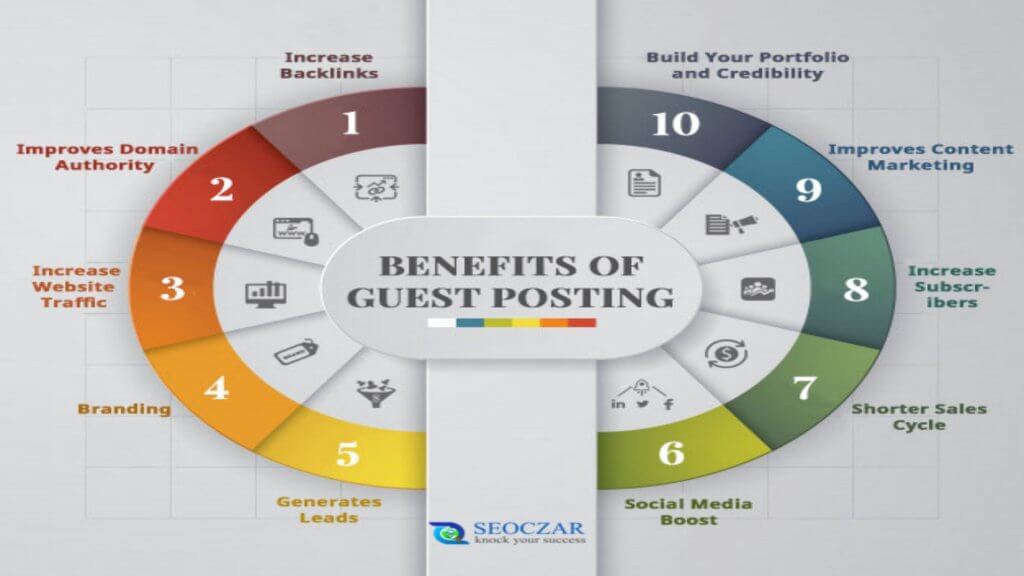
One of the ways to promote your personal or corporate brands is through guest blogging, also known as guest posting


Over the coming weeks, we are going to be bringing you the Ultimate Guide to Guesting Posting, and giving you an insight into aspects of guesting posting like:
Guest posts or, guest blogs are content published in the form of an article on someone else’s website. It really is that simple and it can be a key tool to growing your business and online presence!
Guest blogging is a content marketing tactic that involves writing content to publish on an existing website and include links back to your own website. Depending on where you publish your article, there will be different requirements as to what is accepted, including whether the post is tagged to say who it was written by, the amount of words and links that can be included in the article and whether it remains on the site permanently. These are all important things to check before making a guest post on a website.
A guest post can not only help marketing based roles, but any company wishing to boost its online presence, promote a product or process or reach new audiences.
Within the guest posting world, there are site providers who have sites readily available to publish your content, and then the opposite, those looking for somewhere to post their content. It is a mutually beneficially exchange between the two sides and ensuring you find the correct match for your content; it can be very successful. The guest posting process is all about finding either the right content to match your site, or the right site to match your content! It is a positive element to add good quality content to your own website, or vice versa, to publish on a good quality website to build your brand awareness. With many guest post transactions there can be a money exchange and this will also need to be discussed between the two parties involved, before making your post.
During the upcoming articles in our Ultimate Guide to Guest posting, we will be delving into the actual benefits but here is a quick diagram from SEOCZAR of the 10 most beneficial elements…

To adopt this marketing tools within your own work through the form of guest posts, there are many platforms available that allow you to process a guest post on their sites and some contain multiple domains to choose from. Platform with multiple domains, do some of the hard work for you and make it easy to find somewhere suitable for your content and ensure that you will get the best results from guest posting.
Look out for the next article where we will be sharing more information on our own guest post site, BubbleSEO and other platforms.
Grow your business online with content marketing solutions from Bubble SEO today.
Place An Order
One of the ways to promote your personal or corporate brands is through guest blogging, also known as guest posting

In the world of content marketing, one of the most powerful yet underutilised tools is the topical map. As SEO becomes more complex, building topical authority is essential for boosting rankings, user engagement, and overall content visibility. A topical map serves as a blueprint that guides content creation, allowing marketers to strategically cover every aspect of a subject to establish authority. In this post, we’ll explore what topical maps are, their main benefits, and how they can transform your content strategy. What is a Topical Map? A topical map is a visual representation of the relationships between different topics and subtopics within a specific content domain. Think of it as a web that connects everything you want to cover about a particular subject. For example, if your central topic is "Digital Marketing," a topical map would include interconnected branches to related subtopics such as "SEO," "Content Marketing," "Social Media," and "PPC." Each of these subtopics would also be broken down further into related concepts, creating a comprehensive framework for content creation. The image below provides an example of what a topical map might look like for the subject of Digital Marketing: The Benefits of Using Topical Maps in Content Strategy 1. Improved Topical Authority and SEO Performance One of the key advantages of using a topical map is that it helps build topical authority, which is crucial for SEO success. Search engines like Google have become increasingly sophisticated in understanding context and relationships between topics. By creating content that thoroughly covers a particular subject through interconnected subtopics, your website signals to Google that it is a credible source of information. This boosts your visibility in search engine results. Topical maps ensure that your content strategy is holistic, covering all relevant angles of a subject, which increases your chances of ranking for a wider array of keywords. For more details on how topical authority impacts SEO, check out this insightful article from Search Engine Journal. 2. Comprehensive Content Planning Creating a topical map makes content planning easier and more strategic. Instead of randomly generating blog posts or articles, you use the topical map to determine exactly what pieces are needed to fully cover a topic. This allows you to fill content gaps, address different user intents, and establish a clear publishing schedule. Using a tool like SEMrush can help you identify the key topics and subtopics that are relevant to your niche, ensuring that your content map is comprehensive. This approach keeps your content organised, reduces redundancy, and provides a clear roadmap for content teams. 3. Enhanced User Experience Topical maps also improve the user experience by allowing visitors to easily navigate through your content. When users land on your website looking for specific information, they are likely to explore related content if it's well linked and logically structured. By interlinking articles that cover different aspects of a subject, you create a seamless content journey that keeps users on your site for longer, reducing bounce rates and increasing engagement. By leveraging structured content interlinking, your users will appreciate the in-depth information provided, enhancing their trust in your brand. For tips on how interlinking can boost SEO and user engagement, refer to this guide by Moz. 4. Maximising Content Relevance and Covering Search Intent A topical map helps ensure that you are covering search intent for every stage of the buyer's journey. Whether users are looking for basic information, in-depth guides, or comparisons, your content needs to be relevant to what they are searching for. By mapping out various content types—from educational blog posts to product guides—you ensure that your website caters to all stages of the customer journey. This comprehensive coverage improves the likelihood that users will find exactly what they need, ultimately boosting conversions and building brand authority. For a deeper understanding of search intent and how to create content that addresses it, take a look at Ahrefs’ guide to search intent. The Role of Keyword Clustering in Topical Maps Keyword clustering is an essential component of building topical maps, as it ensures that related keywords are grouped together to effectively cover each subtopic. Instead of creating isolated content pieces targeting single keywords, keyword clustering helps you create pillar and cluster content that addresses multiple related search terms. How Keyword Clustering Boosts SEO Broader Coverage of Search TermsBy clustering related keywords, you improve your chances of ranking for a range of similar queries. For instance, instead of focusing solely on "content marketing strategies," you can create a cluster that also targets keywords like "content marketing plan," "content strategy examples," and "how to create content for marketing." This broader coverage signals to search engines that your content is thorough and relevant to the entire topic. Improved Content RelevanceWhen you target multiple related keywords within a topic, you enhance the relevance of your content to users and search engines. Using keyword clustering, you create a more interconnected content strategy that aligns with Google's goal of providing comprehensive answers. Tools like Keyword Insights can help you identify keyword clusters based on user intent, ensuring that your content aligns perfectly with what users are searching for. Reduced Keyword CannibalisationKeyword clustering also helps prevent keyword cannibalisation, where multiple pages on your website compete for the same search term. By grouping related keywords and assigning them to a specific piece of content, you avoid this issue and ensure that each page has its own distinct focus. How to Create a Topical Map for Your Content Strategy Building a topical map is a step-by-step process that involves careful research and planning. Here’s a short guide to help you get started: Step 1: Choose Your Main Topic Identify the core topic you want to build authority on. This should be relevant to your industry and of interest to your target audience. For instance, if you’re in the digital marketing space, your core topic could be “SEO Strategies for 2024.” Step 2: Research Subtopics Use keyword research tools such as SEMrush or Ahrefs to identify the most important subtopics related to your main topic. These could include elements like "On-Page SEO," "Technical SEO," "Link Building Strategies," etc. Step 3: Cluster Keywords Group related keywords into clusters based on their relevance to each subtopic. This will help you determine which keywords to target within each piece of content, ensuring you cover all relevant aspects comprehensively. Step 4: Create Pillar and Cluster Content Use the topical map and keyword clusters to create a pillar page—a long, comprehensive piece of content that covers your niche in depth. Develop cluster topics or subtopics that provide detailed information on specific aspects of the main topic. Ensure that all related content is well interlinked. Step 5: Review and Update Regularly Your topical map should not be static. As your industry evolves, update your map to cover new topics, trends, or changes in search intent. Keeping your content fresh and relevant will continue to boost your authority. Conclusion: Harness the Power of Topical Maps and Keyword Clustering Incorporating topical maps and keyword clustering into your content strategy is an effective way to build topical authority, enhance user experience, and boost your overall SEO performance. By providing comprehensive coverage of a subject and strategically creating clusters of supporting topics, you establish yourself as an expert, which in turn improves trust and visibility in search engine results. Start creating your topical map and clustering keywords today to take your content strategy to the next level, and make sure to keep evolving your approach as new trends and topics emerge.

Content marketing is the creation of information and content and how this can be shared across different formats

In the ever-evolving world of digital marketing, link building remains a cornerstone strategy for improving search engine rankings and driving organic traffic. As we step into 2025, staying ahead of the curve means adopting innovative and creative techniques to ensure your website stands out. Here are some fresh strategies to enhance your link-building game, with insights into how platforms like Bubble SEO can support your efforts. 1. Leverage Digital PR for High-Authority Backlinks Digital PR combines traditional public relations tactics with modern SEO strategies. By creating newsworthy content, such as original research or impactful stories, you can attract links from reputable media outlets. Partnering with agencies like CoverageBook can help you measure the effectiveness of your campaigns and identify opportunities to improve. 2. Interactive Content for Engagement and Links Interactive content, such as quizzes, calculators, and infographics, naturally attracts backlinks as people share them across platforms. Tools like Canva and Visme enable you to create visually appealing assets that engage audiences and encourage organic link sharing. 3. Focus on Resource Link Building Identify resource pages within your niche and pitch your content as a valuable addition. For instance, if you specialize in marketing, an in-depth guide on AI-driven advertising trends could be an excellent resource for industry-specific pages. 4. Utilise Niche Directories and Industry Awards Niche directories and awards sites provide an opportunity to gain high-quality backlinks. Platforms like Clutch or even industry awards run by Bubble SEO can increase your credibility and link profile while showcasing your expertise. 5. Collaborative Content and Guest Posting Collaborating with influencers or other businesses in your industry can lead to mutually beneficial backlink opportunities. Guest posting remains a tried-and-true method, but ensure that your content provides unique value. Bubble SEO’s guest posting services can connect you with relevant publishers for impactful link placements. 6. Repurpose Existing Content Turn blog posts into videos, podcasts, or presentations to target different audiences. Platforms like SlideShare allow you to share these resources, generating backlinks from users who embed your content on their sites. 7. Monitor Competitor Backlinks Analyzing your competitors’ backlinks can reveal untapped opportunities. Tools like Ahrefs and SEMrush can help identify which sites link to your competitors, enabling you to reach out with your own content. 8. Host Webinars or Virtual Events Webinars and virtual events provide valuable educational content that attendees may link to when sharing their insights. Record these sessions and offer on-demand access, creating evergreen content that continues to generate backlinks over time. 9. Create Tools or Templates Develop free tools or templates that solve a common problem in your industry. For example, marketing calculators or downloadable content calendars can attract backlinks from businesses and individuals referencing your resources. 10. Engage in Community Forums and Q&A Sites While not a direct link-building strategy, contributing valuable insights on forums like Reddit or Quora can lead to organic backlinks. These platforms allow you to build relationships and establish authority in your niche. Conclusion Link building in 2025 is all about creativity, authenticity, and value-driven content. By adopting these innovative techniques, you can stay ahead of the competition and build a robust backlink profile. Platforms like Bubble SEO are here to help, offering tailored solutions to meet your unique marketing needs. Start implementing these strategies today, and watch your SEO efforts flourish!

In the constantly changing landscape of SEO, staying ahead of the competition means focusing on more than just keywords and backlinks. A growing emphasis is on building topical authority—a strategy that helps websites become recognised experts in their niche, providing immense value to both search engines and users alike. But what exactly is topical authority, and why is it crucial for SEO success? Let’s delve deeper into this concept and understand how to build it effectively. What is Topical Authority? Topical authority refers to how well a website is trusted to provide comprehensive, expert information on a particular subject or niche. In simple terms, it's about becoming an authority in a specific area by covering it extensively and in-depth. When Google sees that your website consistently offers valuable, well-researched, and complete information about a topic, it begins to consider you a "go-to" source for users looking for information on that subject. For example, if your website specialises in “vegan cooking,” building topical authority means creating a vast amount of content that thoroughly covers every aspect of vegan cooking—recipes, ingredients, benefits, challenges, tips for beginners, and more. By consistently providing high-quality, interconnected content, your site gains authority over time, which translates to higher rankings and increased organic traffic. The Importance of Building Topical Authority 1. Improved Search Engine Rankings Search engines, particularly Google, are constantly working on improving the relevance of the search results they provide to users. With advancements in AI and semantic search, Google now looks beyond individual keywords and assesses the overall context of a website. Websites with topical authority are more likely to be ranked higher because Google recognises them as comprehensive and trustworthy sources. 2. Increased User Trust and Engagement Users are more likely to trust websites that provide in-depth, reliable information on a subject they are researching. If a visitor lands on your website and finds a treasure trove of well-organised content, they are more likely to stay longer, interact with your site, and return in the future. This engagement boosts important metrics like time on page and bounce rate, which further helps with SEO. 3. Higher Relevance in Competitive Niches When you establish topical authority, it helps you stand out even in a highly competitive niche. While it may take longer to build compared to targeting specific keywords, the payoff is that you become a resource that Google and users will continue to trust, giving you a competitive edge. Topical authority is especially important in YMYL (Your Money, Your Life) areas, such as health, finance, and legal content, where credibility is key. 4. Sustainable Long-Term Growth Instead of chasing temporary ranking gains through keyword manipulation or questionable link-building practices, building topical authority provides a long-term, sustainable path to SEO success. Google prioritises user satisfaction, and websites that genuinely offer valuable information are more likely to withstand frequent algorithm changes and updates. How to Build Topical Authority: A Step-by-Step Guide Building topical authority requires a well-planned approach that covers the subject matter thoroughly and strategically. Here's a short guide to help you get started: Step 1: Define Your Niche To become an authority, you need to start with a well-defined niche. Broad topics are difficult to dominate, so focus on a specific segment within your industry. For example, instead of focusing on “fitness,” narrow it down to “strength training for women” or “HIIT workouts for beginners.” This focused approach allows you to provide a complete, detailed collection of resources that users and search engines will appreciate. Step 2: Conduct Comprehensive Topic Research Once your niche is clear, research every aspect of it. Tools like Ahrefs and SEMrush can help you identify content gaps and topics that are underrepresented in your niche. Think of the questions people ask, the pain points they have, and the related topics that can support your main subject. The goal is to create a content plan that leaves no question unanswered. Step 3: Create Pillar Content and Cluster Topics Create a pillar page—a long, comprehensive piece of content that covers your niche in depth. From there, develop cluster topics or subtopics that provide detailed information on specific aspects of the main topic. For example, a pillar page on “strength training for women” could link to subtopics like “best strength training exercises,” “beginner strength training programme,” and “benefits of strength training for women.” This internal linking between pillar and cluster content strengthens the topical connection and helps search engines understand that your website covers the subject comprehensively. Step 4: Use High-Quality Backlinks To further enhance your topical authority, consider acquiring backlinks from other reputable sources in your industry. Platforms like Bubble SEO make it easier to gain access to high-authority guest posting opportunities, which can drive traffic and signal to Google that your site is a trusted resource. Aim for backlinks that are relevant to your niche and are from authoritative domains to boost your credibility. Step 5: Maintain and Update Content Google favours websites that are well-maintained and up-to-date. Continually update existing content to reflect the latest trends, statistics, and developments in your niche. Tools like Google Search Console help identify opportunities to refresh content that may be losing its rank over time. This ensures that your content remains relevant and useful, boosting your authority even further. Tips for Strengthening Topical Authority Answer Users' Questions: Make sure your content addresses real questions and pain points users have. Check forums like Reddit and Quora to see what questions people are asking in your niche. Engage with the Community: Actively participate in your niche community through blog comments, social media, and forums. The more you are seen as a contributor, the more authoritative your website will appear. Utilise Structured Data: Incorporate schema markup to help search engines understand the relationships between different pieces of content on your site. This boosts visibility in search results and helps with rich snippets. In an increasingly competitive digital world, building topical authority is the key to establishing your website as a trusted resource in your niche. By providing comprehensive, in-depth content and strategically creating clusters of supporting topics, you not only improve your visibility in search engine results but also build trust and loyalty with your audience. While high-quality backlinks and content promotion are important components of the strategy, the core of topical authority lies in consistently delivering value to your readers. Start by narrowing down your niche, mapping out a detailed content plan, and continually updating your material. By positioning yourself as an expert voice, you’ll create a sustainable path to SEO success that withstands algorithm changes and fosters lasting relationships with your audience.

Guest Posting is a practice where individuals or companies contribute articles to other websites or blogs.